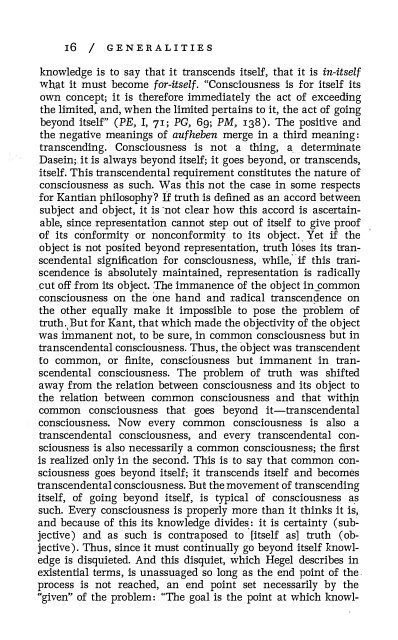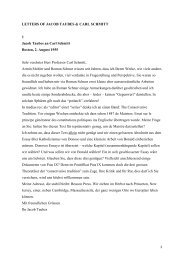selection one - Sound and Signifier
selection one - Sound and Signifier
selection one - Sound and Signifier
Create successful ePaper yourself
Turn your PDF publications into a flip-book with our unique Google optimized e-Paper software.
16 / G E NE R A L IT I E S<br />
knowledge is to say that it transcends itself, that it is in-itself<br />
what it must become for-itself. "Consciousness is for itself its<br />
own concept; it is therefore immediately the act of exceeding<br />
the limited, <strong>and</strong>, when the limited pertains to it, the act of going<br />
beyond itself" (PE, I, 7I; PG, 69; PM, I38). The positive <strong>and</strong><br />
the negative meanings of aufheben merge in a third meaning:<br />
transcending. Consciousness is not a thing, a determinate<br />
Dasein;. it is always beyond itself; it goes beyond, or transcends,<br />
itself. This transcendental requirement constitutes the nature of<br />
consciousness as such. Was this not the case in some respects<br />
for Kantian philosophy'? If truth is defined as an accord between<br />
subject <strong>and</strong> object, it is -not clear how this accord is ascertainable,<br />
since representation cannot step out of itself to give proof<br />
of its cbnformity or nonconformity to its object .. Yet if the<br />
object is not posited beyond representation, truth loses its transcendental<br />
signification for consciousness, while,' if this trariscendence<br />
is absolutely maintained, representation is radically<br />
cut off from its object. The immanence of the object in_common<br />
consciousness on the <strong>one</strong> h<strong>and</strong> <strong>and</strong> radical transcen!ience on<br />
the other equally make it impossible to pose the problem of<br />
truth .. But for Kant, that which made the objectivity of the object<br />
was i:l:nmanent not, to be sure, in common consciousness but in<br />
transcendental consciousness. Thus, the object was transcendent<br />
to common, or finite, consciousness but immanent in transcendental<br />
consciousness. The problem of truth was shifted<br />
away from the relation betw'een consciousness <strong>and</strong> its object to<br />
the relation between common consciousness <strong>and</strong> that within<br />
common consciousness that goes beyond it-transcendental<br />
consciousness. Now every common consciousness is also a<br />
transcendental consciousness, <strong>and</strong> every transcendental consciousness<br />
is also necessarily a common consciousness; the first<br />
is realized only in the second. This is to say that common consciousness<br />
goes beyond itself; 'it transcends itself <strong>and</strong> becomes<br />
transcendental consciousness. But the movement of transcending<br />
itself, of going beyond itself, is typical of consciousness as<br />
such. Every consciousness is properly more than it thinks it is,<br />
<strong>and</strong> because of this its knowledge divides,: it is certainty (sub<br />
jective ) <strong>and</strong> as such is contraposed to [itself as] truth (objective<br />
). Thus, since it must continually go beyond itself knowledge<br />
is disquieted. And this disquiet, which Hegel describes in<br />
existential terms, is unassuaged so long as the end point of the ,<br />
process is not reached, an end point set necessarily by the<br />
"given" of the problem : "The goal is the point at which knowl-




